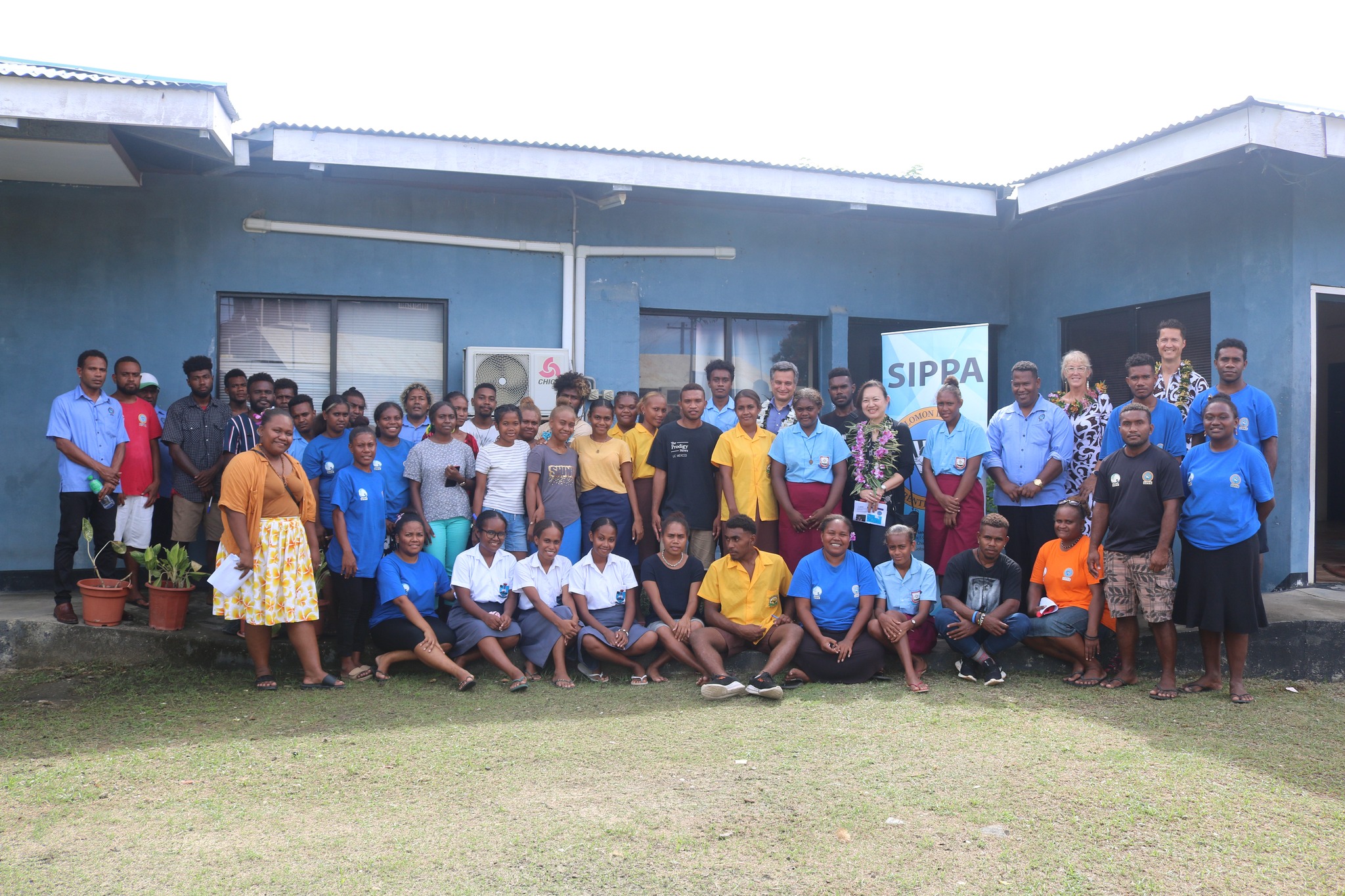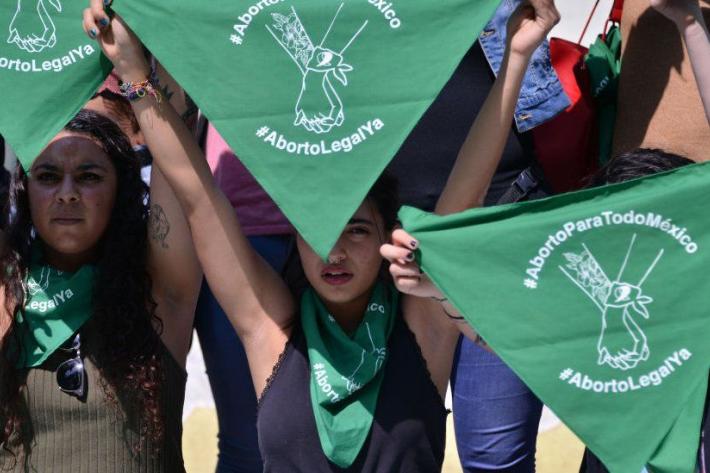Latest press releases
A selection of stories from across the Federation

Netherlands
Rutgers triumphs in landmark court case against lies, online hate and disinformation
Rutgers, the Netherlands’ leading sexual and reproductive health expert and IPPF’s Member Association, has today secured a landmark legal win against an ultra-conservative group.
For media enquiries


| 28 March 2023
IPPF’s Director General Visits Solomon Islands and Australia
The Director General of the International Planned Parenthood Federation (IPPF), Dr Alvaro Bermejo, is in Australia this week for high level meetings with Australian Government Ministers and the Australian Department of Foreign Affairs and Trade (DFAT). He is joined by Ms Tomoka Fukuda, Regional Director of IPPF’s East and Southeast Asia and Oceania Region (ESEAOR) and Ms Phoebe Ryan, IPPF’s Chief of the Australia and New Zealand Office. In Australia, Dr Bermejo has been privileged to meet with Australia’s Minister for International Development and the Pacific, the Hon Pat Conroy. Together, they discussed how Australia can play a leadership role in advancing sexual and reproductive health and rights through Australia’s international development cooperation. Last week, Dr Bermejo and Ms Fukuda visited IPPF’s Member Association in Solomon Islands, the Solomon Islands Planned Parenthood Association (SIPPA). In Solomon Islands, they witnessed SIPPA’s life-saving and critical work delivering sexual and reproductive healthcare on the ground, including mobile outreach in remote communities of Malaita Province. Australia has been a long-standing and critical partner to IPPF, supporting programming to reach women, girls, and marginalized groups across the development–humanitarian continuum around the world, with a particular focus on the Asia Pacific. In December 2022, IPPF and DFAT signed a new four-year global funding agreement for 2023 to 2026, part of which includes dedicated support to programming across the Pacific. AUD 19 million is dedicated as global funding towards the delivery of IPPF’s Strategy 2028, along with a further AUD 5.7 million to support the delivery of IPPF’s Pacific Niu Vaka Strategy, Phase 2. This generous investment will enable IPPF to reach an anticipated 1.8 million people in the Pacific over the next six years with 4.2 million essential sexual and reproductive services. IPPF is proud to stand alongside our Pacific MAs as they continue to advocate for the health and rights of those most underserved and excluded, reaching communities with essential information and high quality, person-centred sexual and reproductive health care. In 2021, IPPF reached over 72 million people around the world with more than 155 million sexual and reproductive health services and contributed to 121 policy and legislative changes in defence of SRHR. IPPF is grateful for Australia’s ongoing support in enabling this impact. IPPF’s Director General, Alvaro Bermejo shared: “IPPF are delighted to be working with the Australian Government to continue improving the sexual and reproductive health and rights (SRHR) of women and girls across the globe. We are grateful to them for helping us deliver more services and support at a time when inequalities are deepening, the opposition is growing, and humanitarian crises continue to place the lives of millions, particularly women and girls, at risk. As we look to build the future with our new strategy, continued support from global partners is crucial to achieving a world where everyone has access to sexual and reproductive healthcare. We hope DFAT’s strong global commitment will inspire other global leaders to take action.” For media enquiries, please contact Karmen Ivey on [email protected] or Phoebe Ryan on [email protected] About the International Planned Parenthood Federation The International Planned Parenthood Federation (IPPF) is a global service provider and advocate of sexual and reproductive health and rights for all. For 70 years, IPPF has delivered high-quality sexual and reproductive healthcare and helped advance sexual rights, especially for people with intersectional and diverse needs that are currently unmet. Our Member Associations and partners are independent organizations that are locally owned, which means the support and care they provide is informed by local expertise and context. We advocate for a world where people are provided with the information they need to make informed decisions about their sexual health and bodies. We stand up and fight for sexual and reproductive rights and against those who seek to deny people their human right to bodily autonomy and freedom. We deliver care that is rooted in rights, respect, and dignity - no matter what.

| 22 February 2022
Colombia decriminalizes abortion
Today, the Colombian Constitutional Court decriminalized abortion up to 24 weeks in another victory for the Green Wave sweeping through Latin America. The historic decision follows years of campaigning by women's right's activists across Colombia and came off the back of two lawsuits that asked the court to declare article 122 of the penal code, that "the woman who causes her abortion or allows another to cause it, will incur a prison sentence from sixteen (16) to fifty-four (54) months" as unconstitutional. The court called an extraordinary meeting today, Monday 21st February, and took just a few hours to come to its decision which will go into effect immediately. ProFamilia, the International Planned Federation's Member Association in Colombia, and Colombia's largest provider of legal abortion care were heavily involved in pushing to extend the rights of those needing to access abortion care. Marta Royo, Executive Director for Profamilia, IPPF's Member Association in Colombia, said: "Today is a ground-breaking moment for the people of Colombia and a long-overdue guarantee of reproductive rights and dignity for all those who need abortion care, especially poor and rural women who bear the brunt of restrictive abortion policies. "The decriminalization of abortion up to 24 weeks in Colombia and the Green Wave movement across Latin America is centred not just on public health, but also the full lives, citizenship and human rights of girls, adolescents, and women – who, for multiple reasons, including inequity, access to education, gender-based violence and barriers to healthcare – continue to face unintended pregnancies. "The freedom for women to finally make their own choices about their pregnancies and their bodies is fundamental to disrupting the cycle of poverty that so many in Colombia face. This monumental decision is also a win for the dedicated health care providers, who will finally be recognized as people who simply care about the needs of others." While Colombian women have supposedly been able to access abortion care since 2006 under three circumstances: if their life or health is at risk, in cases of fatal foetal abnormalities, or if the pregnancy is the by-product of rape or incest, in reality, the criminalization of abortion persisted. The Guttmacher Institute found that less than one per cent of the estimated 400,000 abortions carried out each year in Colombia are performed legally, with women, especially poor, rural, vulnerable and marginalized women, facing significant barriers to accessing safe and timely abortion care. Many Colombian women are instead forced to carry their pregnancies to term or else seek other methods to end them. Figures collected by ProFamilia showed that during 2020, there were at least 26,223 unsafe abortions across Colombia, a startling amount for which consequences range from infection to life-changing injuries to death. As per the previous abortion law, other women have been imprisoned for up to four and a half years for having an abortion, even in cases where abortion should have been legal. In a shocking example of discrimination, data collected showed that poor rural women were more likely to be charged, with a third of those who faced charges also survivors of sexual violence. Eugenia Lopez Uribe, IPPF's Regional Director for Americas and the Caribbean Region, said: "Today Colombia took another step in the right direction for gender equality and full human rights for all, and we are incredibly proud of IPPF's Member Association, ProFamilia, for their tireless work alongside thousands of activists across Colombia and Latin America "This 24-week decriminalization is historic in the region and especially remarkable when we consider the current fragility of abortion rights globally and the anti-choice movements which continue to plague nations across the world, including in countries close to home like the United States of America. "While today we are celebrating this historic decision, the Green Wave is strong and growing, and the fight for reproductive rights and justice will not end until every person can access high-quality sexual and reproductive healthcare when and where they need it." For media enquiries in English, please contact Karmen Ivey on [email protected] or [email protected] For media enquiries in Spanish or during UK night-time hours, please contact Pamela Martin Garcia on [email protected]

| 21 February 2022
Mexico’s Supreme Court votes to decriminalize abortion
The International Planned Parenthood Federation (IPPF) welcomes the unanimous decision taken by the Supreme Court of Mexico to decriminalize abortion. The decision is a step closer for women and pregnant people to fully exercise their reproductive rights and bodily autonomy through safe and legal abortion care. Abortion is legal in four out of the 32 federal entities in Mexico. Only four other countries in the region - Argentina, Cuba, Uruguay, and Guyana have almost unrestricted and legal access to abortion care. Eugenia Lopez Uribe, IPPF’s Regional Director for the Americas and Caribbean said: “This historic ruling by the Supreme Court of Mexico is thanks to the feminist movement in Mexico and in the region, who have been relentless in their fight the law to recognize the dignity and humanity of people seeking abortion care. This decision will continue the Green Wave ripple effect across the region - we look at Argentina last year and now Mexico, these movements give us hope and motivation to continue to fight for sexual and reproductive health and rights for all.” Esperanza Delgado, Strategic Director for Advocacy and Interinstitutional Relations of MEXFAM added: “September 7 will become a memorable date in Mexico. In a progressive pronouncement in favour of reproductive autonomy, respect for the secular State, and the rights of women and pregnant people over those of the embryo, Mexico's highest legal authority indicated that it is unconstitutional to punish those who decide to terminate a pregnancy at its early stage. “All of us who have joined forces and who are fortunate enough to fight for the recognition of human rights, should be proud and may our achievement inspire others in every corner of the planet. MEXFAM is committed to making this long-awaited legislation a reality for every person that decides to choose.” For media inquiries please contact [email protected]

| 21 February 2022
Statement on the Guttmacher Institute's “Just the Numbers” report: a snapshot of the impact of the UK aid cuts
The Guttmacher Institute has today released new data showing the impact of the UK aid cuts on sexual and reproductive health and rights for the fiscal year 2021 - 2022. The figures show the devastating impact on the lives of women and girls around the world. Together with the effects of the Covid-19 pandemic, the cuts threaten to undo years of progress towards gender equality and increasing access to reproductive choice. When surveyed, major sexual and reproductive health organizations reported they expected to receive at least £218.9 million in the fiscal year (FY) 2021–2022 (from April 2021 to March 2022) for family planning activities in low- and middle-income countries. The resulting cuts to the family planning programs of these major program-implementing organizations are estimated to have totalled £132.4 million in FY 2021–2022. The loss of funding will result in: 9.5 million fewer women and couples receiving contraceptive services 4.3 million more unintended pregnancies 1.8 million more unplanned births 1.4 million more unsafe abortions and 8000 more maternal deaths The figures also show how much could have been achieved through sustained UK aid spending. IPPF’s Director-General, Dr Alvaro Bermejo, said: “The Guttmacher figures are a harrowing, but sadly unsurprising, insight into the catastrophic impact that the UK aid cuts will have on the health and lives of millions of women, girls and marginalized people across the globe, and serve to confirm what sexual and reproductive health charities have been saying since they were first made aware of the cuts. “We must also remember that the Guttmacher numbers are just a snapshot of the 2021 – 2022 fiscal year, and the effects of the Government’s sudden and short-sighted termination of support will stretch far beyond that, piling unthinkable pressure on people already dealing with the fallout of the COVID-19 pandemic, and leading to millions of unintended pregnancies and thousands of preventable deaths. “With the upcoming spending review in November, we ask the UK Government to reconsider the cuts, which IPPF still believe to be outside of the boundaries of the law, and reinstate the 0.7% commitment, so that it can finally deliver on its promises to the millions of people it chose to abandon.” IPPF also signed on to a joint letter from the UK SRHR Network. For media inquiries please contact [email protected]
















